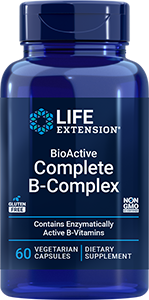
Methylated B Vitamins 101: What They Are and Why They Matter
Published: June 2025
When it comes to supporting energy, brain function, and overall health, B vitamins are essential. Even better, B vitamins are everywhere! Whether you're eating a hearty meal with chicken, fish, or beef, or snacking on fruits, vegetables, legumes, and grains, you're getting at least some B vitamins in the mix. Plus, many foods are fortified with B vitamins, including cereals and enriched flour.
However, not all forms of B vitamins work the same for everyone. Many of us have genetic variations that affect how our bodies process and utilize these nutrients. That's where methylated B vitamins come in. They provide a bioavailable form of these critical nutrients, ensuring that we get the full benefits even if our bodies struggle with standard forms.
Let's dive into the importance of methylated B vitamins, exploring their role in metabolism, energy production, brain health and cellular health. We'll also break down how methylation works, why certain individuals benefit from these specialized vitamins, and how to choose the right B-complex supplement for you.
What are B vitamins?
B vitamins are like tiny powerhouses that help keep our bodies running smoothly. Overall, B vitamins are involved in a wide variety of crucial functions in the body, and are involved in everything from supporting energy production to brain health.
B1 (Thiamine):
Helps turn the food we eat into fuel and keeps our nerves and muscles working properly.B2 (Riboflavin):
Helps with energy production and acts as an antioxidant, protecting our cells from oxidative stress.B3 (Niacin):
Supports our metabolism, helps keep our DNA in good shape, and in high amounts can help maintain already-healthy cholesterol levels.B5 (Pantothenic Acid):
Plays a key role in breaking down fats and carbohydrates for energy.B6 (Pyridoxine):
Important for processing proteins and creating neurotransmitters, which help with brain function and mood.B7 (Biotin):
Helps produce fatty acids and is well-known for keeping our hair, skin and nails healthy.B9 (Folate):
Supports DNA and RNA production, helps form red blood cells, and plays a big role in methylation—a process essential for our overall health.B12 (Cobalamin):
Works alongside folate to support methylation, helps maintain nervous system health, and is crucial for our red blood cell formation.
Is There a Vitamin B4 or B8?
Good question! If you're wondering where these "missing link" B vitamins are, like B4 and B8, they are compounds that were initially lumped in with the B vitamins but were later found not to meet the definition of a vitamin.
What does "methylated" mean?
The term "methylated" refers to a biochemical process called methylation, which is like a tiny molecular switch that helps the body function properly. Methylation involves adding a methyl group (one carbon and three hydrogen atoms) to molecules, which changes the way the molecule acts in the body, helping with things like detoxification, cellular health and neurotransmitter production.
Some of the B vitamins require the addition of a methyl group before they can do their whole job. So when it comes to B vitamins, "methylated" means they're in a ready-to-use form, making it easier for the body to absorb and utilize them efficiently, especially for people who have genetic variations affecting this process.
Some of those differences, like MTHFR gene mutations, make it harder to convert standard B vitamins into their active forms. By taking methylated B vitamins, such as methylfolate instead of folic acid, or methylcobalamin instead of cyanocobalamin for vitamin B12, the body skips the extra conversion step and gets the nutrients in their most effective state. This can be a game-changer for those needing extra support in areas like metabolism, brain health and heart health.
The methylated form of folate, 5-methyltetrahydrofolate (5-MTHF), is the active form that can then go on to donate one of its methyl groups to homocysteine (via the action of vitamin B12 and its partner enzymes) thus converting it to methionine. Maintaining healthy levels of homocysteine may support numerous aspects of health, including supporting healthy cardiovascular function as well as cognitive health.
Both folate and vitamin B12 must be methylated to be active, and their action in turn methylates homocysteine. The other B vitamins do not need to be methylated; however, they may be altered in other ways to become active.
Many people choose a B-complex supplement with the methylated forms of these vitamins because they are already "active" and don't require enzymatic activity to activate them.
Explore Our Best Vitamin B Supplements
Who might benefit the most from methylated B vitamins?
Methylated B vitamins can be a game-changer for energy, brain function, and overall well-being, especially if you have trouble processing regular B vitamins. Since they're already in their active form, the body doesn't have to work as hard to convert them, meaning they're absorbed more efficiently.
Methylated B vitamins also play a big role in heart health, helping the body maintain healthy homocysteine levels, which support cardiovascular function. For those of us with genetic variations like MTHFR mutations, switching to methylated forms—like methylfolate instead of folic acid or methylcobalamin for B12—can help us get the full benefits of these vitamins.
But that doesn't mean bioactive B vitamins are only for people with this gene mutation! If there's one thing we can all agree on, it's that feeling energized and supporting a healthy brain makes life a whole lot easier—and that's where methylated B vitamins really shine.
Bioactive B vitamins also play a huge role in metabolism, helping your body process glucose, fat, and alcohol, while supporting healthy red blood cell production. B vitamins are key players in our brain chemistry and help support heart health by helping to maintain cholesterol levels already within normal range.
Bioactive B vitamins:
- Promote energy production and a healthy metabolism
- Encourage brain, cellular and organ health
- Support red blood cell production
- Are more biologically active, so your body can use each nutrient more effectively
- Help maintain nervous system health
- Promote healthy brain function
Whether you're focused on long-term health or just want to stay sharp and energized, getting enough of these powerhouse nutrients can make a real difference in how you feel and function.
What are the best food sources of vitamin B?
Some foods shine as excellent sources of specific B vitamins. For example, folate is packed into dark leafy greens, while vitamin B12 is almost exclusively found in animal products. Since these nutrients are crucial for various functions in our body, including metabolism, nerve function, and overall well-being, many people turn to B vitamin supplements to fill in any gaps.
How to choose the right B vitamin supplement
When shopping for B vitamin supplements, it's important to check the label for the active forms of these nutrients—look for names like 5-MTHF (methylfolate), methylcobalamin (B12), pyridoxal 5'-phosphate (vitamin B6), and riboflavin 5'-phosphate (B2). These forms are already in their bioavailable state, meaning the body can use them efficiently without extra conversion steps.
Deciding between individual B vitamins, a B-complex or a multivitamin depends on your personal health needs. Someone with specific goals—like a vegan seeking extra B12 or a person looking to support already-healthy cholesterol levels with a higher dose of niacin—may prefer individual supplements. Others might opt for a B-complex that offers a balanced mix of B vitamins in one convenient formula.
Either way, discussing supplement choices with a healthcare provider is always a good idea to ensure the best fit for individual needs.
Need more guidance?
Still not sure which energy supplements are right for you? Take our free health needs quiz to get a personalized recommendation on the energy-supporting nutrients tailored to your individual health and wellness goals.
About the Author: Carlie Bell, ND, is a licensed Naturopathic Physician and adjunct medical instructor at Saint Louis University. Dr. Bell is also the program director of the American College of Acupuncture and Oriental Medicine.
References
- Carboni L. "Active Folate Versus Folic Acid: The Role of 5-MTHF (Methylfolate) in Human Health." Integr Med (Encinitas). July 2022. https://pmc.ncbi.nlm.nih.gov/articles/PMC9380836/
- Jakubowski H, Witucki Ł. "Homocysteine Metabolites, Endothelial Dysfunction, and Cardiovascular Disease." Int J Mol Sci. January 2025. https://pubmed.ncbi.nlm.nih.gov/39859460/
- Wang Z, et al. "B vitamins and prevention of cognitive decline and incident dementia: a systematic review and meta-analysis." Nutr Rev. March 2022. https://pubmed.ncbi.nlm.nih.gov/34432056/
- "B Vitamins and Folic Acid." National Health Service (NHS). August 2020. https://www.nhs.uk/conditions/vitamins-and-minerals/vitamin-b/
- "B Vitamins." MedlinePlus. National Library of Medicine. September 2021. https://medlineplus.gov/bvitamins.html
- "Methyl Group." National Cancer Institute (NCI). https://www.cancer.gov/publications/dictionaries/cancer-terms/def/methyl-group
- "MTHFR methylenetetrahydrofolate reductase [Homo sapiens (human)]." National Center for Biotechnology Information (NCBI). National Library of Medicine. May 2025. https://www.ncbi.nlm.nih.gov/gene/4524
Like what you read?
Please subscribe to get email updates on this blog.










